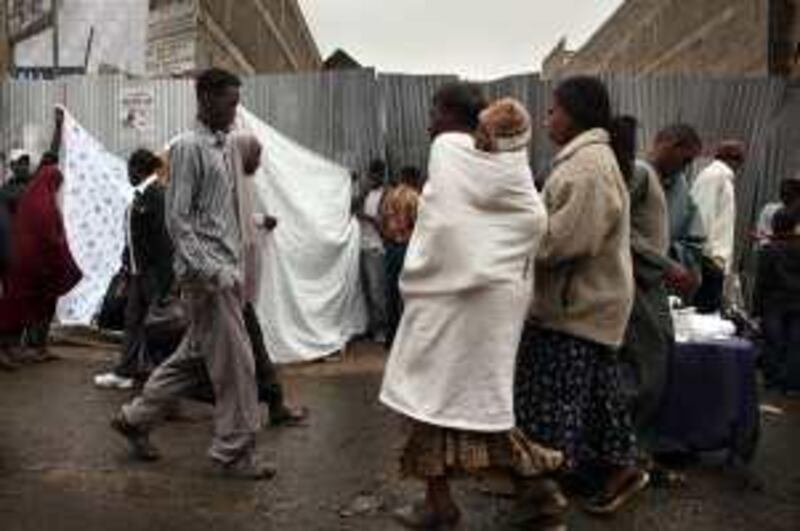NAIROBI // Refugees from East Africa's devastating conflicts have regularly flocked to Kenya, a bastion of stability in the troubled region. As the wars, such as Somalia's 20-year conflict, drag on, refugee camps in Kenya are overflowing. Now refugees from Somalia, Congo, Ethiopia and Sudan are migrating from the crowded, squalid camps in Kenya's hinterland to Nairobi, the capital. Attracted by the promise of jobs, money and a better life in the big city, these asylum-seekers often face more hardships than those in the camps.
Exploitation, harassment, prostitution, rape and poor living conditions are some of the challenges urban refugees face in Kenya, according to a new study by a consortium of humanitarian groups. The report, Hidden and Exposed: Urban Refugees in Nairobi, Kenya, released last week by the International Rescue Committee, Humanitarian Policy Group and Refugee Consortium of Kenya, says that aid organisations often overlook the needs of urban refugees.
"As the world urbanises, refugees are increasingly moving to cities in the hope of finding a sense of community, safety and economic independence," said Sara Pavanello, a research officer with Humanitarian Policy Group, a British aid research organisation. "Yet what many actually find are precarious living conditions and harassment, discrimination and poverty." There are about 46,000 refugees in Nairobi registered with the UN refugee agency, the UNHCR, although unofficial estimates suggest the figure could be much higher. Many are unaware of their rights and do not register. Others claim the registration process is too cumbersome or that it forces them to leave their neighbourhoods and travel across town, which increases their exposure to possible abuse by the authorities.
"The police will harass you while you are walking on the streets, especially when you look like a Somali," said one urban refugee, who spoke on condition of anonymity, fearing reprisals. "They will demand money, and therefore we are afraid to walk on the streets." The three-month study found that Kenyan authorities are often ill informed about refugees' rights. Arbitrary detentions and harassment by police is common and refugees usually have to pay bribes to be released.
"Refugees spoke of constant harassment by police from officers demanding financial bribes to physical beatings and intimidation," said Kellie Leeson, the Kenya country director for the International Rescue Committee, a US aid organisation. "Some refugee communities have even come together and organised monthly financial collections, which they pay to police to prevent such harassment." The federal government does not have an official encampment policy, but many authorities are unaware that refugees are allowed to leave the camps near the border of Somalia and Sudan. Many refugees interviewed revealed that they do not want to be based in overcrowded camps where there are few job opportunities and harsh climatic conditions.
"Refugees in Nairobi overwhelmingly tell us that they come here because they want to be independent and able to support their families," Ms Leeson said. "Refugees have been forced out of their countries by violent conflict or persecution. They are not here by choice and they don't want to be dependent on humanitarian aid." Refugees in the city are forced into poorly paid jobs and find it difficult to afford such adequate essentials as food, housing, health care and education. Women and girls often turn to prostitution and end up working on K Street, a section of Nairobi notorious for the sex trade.
"It is not uncommon for young girls who left camps to end up on the infamous K Street because of the absence of proper livelihood opportunities," said Laban Osoro, a refugee rights lawyer in Kenya. The situation is compounded by the fact that refugees are often exploited because they lack official papers and are sometimes charged higher rents than their Kenyan neighbours. "The Kenyan government took a big step forward in protecting and supporting refugees when it passed the refugee act in 2006," said Lucy Kiama, executive director of the Refugee Consortium of Kenya. "However, the act's effectiveness has been undermined by a lack of institutional capacity to implement it as well as the absence of a national policy needed to execute it."
The report called for Kenya to reform its police force and train police and government departments on refugee rights and documentation. It also said the donor community must recognise the shift of refugees to urban areas and provide services to meet these new challenges. Many urban refugees live in Eastleigh, a teeming neighbourhood of muddy streets and tacky, hastily built shops. Somali traders, fleeing the war in their own country, have set up thriving businesses selling used clothing, pirated movies and cheap electronics.
The report concludes that, with the right support, many refugees can secure their livelihoods and positively contribute to the local economy. "Refugees have the potential to be an economic engine in Nairobi," Ms Leeson said. "Much more could be done to harness this opportunity by investing in refugee livelihood projects." @Email:mbrown@thenational.ae





